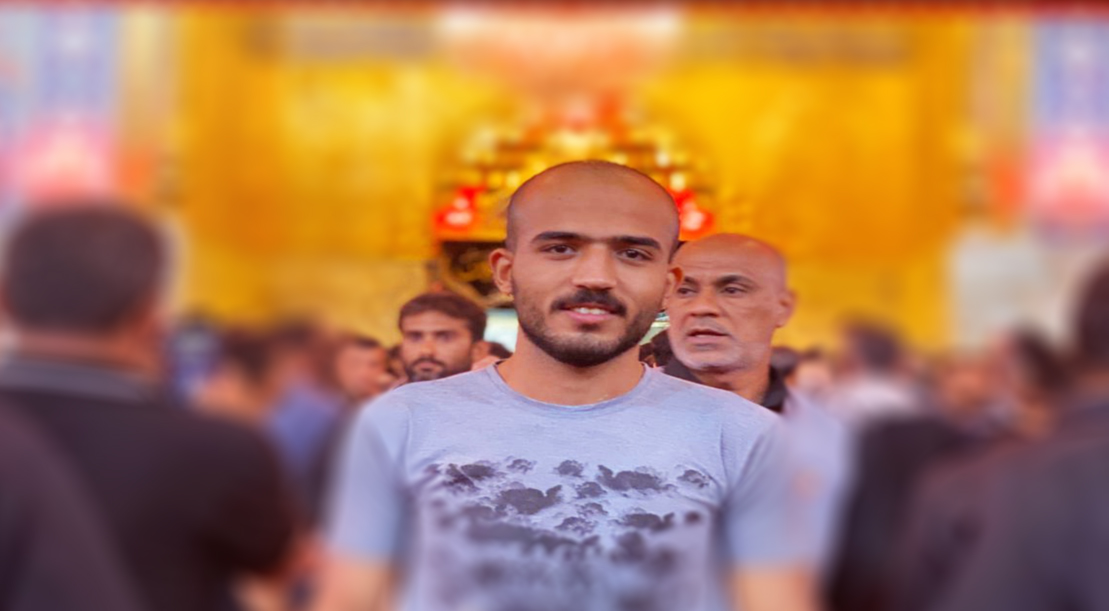Updated: Ali Fadhel Abbas, a 21-year-old garage worker, was arbitrarily arrested in 2019 at Bahrain International Airport upon returning from Iraq, where he visited the shrine of Imam Husain on the 40th day of his martyrdom. During his detention, he endured torture, forced disappearance, and medical neglect. Currently, he is held at Jau prison, serving a five-year sentence following an unfair trial.
When Ali arrived at the airport on 31 October 2019, he was questioned about his trip. Civilian officers from the passport department arrested Ali without presenting an arrest warrant, and he was subsequently transferred to the Criminal Investigations Directorate (CID) for further investigation. Ali experienced enforced disappearance during the initial hours of his arrest. His family became aware of his arrest through his friends who were with him; they were not officially notified of his arrest. Several hours after his arrest, the family received a call from Ali, informing them that he was at the CID. Notably, Ali had been summoned for interrogation multiple times before his arrest.
During the investigations, CID officers questioned Ali about individuals who had participated in demonstrations and expressed dissent against the system. Despite the pressure, Ali consistently maintained that he did not know their names and had not engaged in any activities related to the revolution or assemblies. Subsequently, he was transferred to the “Interrogations Building” (Building 15) of Jau Prison, where officers interrogated and tortured him for eight days, with sessions lasting for nine to 11 hours each day.
After 17 days from his initial arrest, Ali was moved to the CID in Adliya and remained there for 15 days before being transferred to the Dry Dock Detention Center. At the onset of the interrogation, Ali did not have legal representation, and thus, he lacked access to legal counsel. Even after appointing a lawyer, his lawyer was still denied the right to attend the investigation. It was only 23 days after his arrest that Ali was brought before a judge at the Public Prosecution Office (PPO).
Despite enduring a month of torture following his arrest, Ali did not confess. He was finally allowed to contact his family for the first time while being at Dry Dock Detention Center.
Ali has been accused of joining a terrorist group and receiving funds and fireworks for it, with the alleged intention of disrupting the Bahraini Constitution and laws and preventing state institutions and public authorities from fulfilling their mission. On 3 November 2020, the initial ruling was issued against Ali by the First High Criminal Court, convicting him in absentia in a mass trial that included 52 defendants. The charges included joining a terrorist group, receiving funds and fireworks, and transporting and storing explosives for terrorist purposes. Consequently, he was sentenced to five years in prison. Ali appealed the ruling, but the Court of Appeal rejected the appeal and upheld the initial decision on 11 April 2021. Subsequently, the Court of Cassation also rejected the appeal on 12 July 2021.
During the Coronavirus outbreak, family visits were replaced with video calls. Initially, Ali regularly contacted his parents, but as the pandemic progressed, he communicated with them once every two to three weeks. In September 2020, scabies spread among prisoners in the Dry Dock Detention Center due to a new inmate suffering from it, resulting in Ali getting infected. On 12 September 2020, Ali informed his family that his condition had worsened and requested them to bring him medicine. His condition improved after using the medicine. However, unlike other inmates who were later transferred to their cells, Ali was moved to a cell shared with foreign prisoners with whom he couldn’t communicate. Despite the spread of the coronavirus, Ali was not provided with any protective measures, such as masks or gloves.
In August 2023, Ali took part in a collective hunger strike alongside a significant number of prisoners within Jau Prison. The hunger strike persisted for almost a month and aimed to protest against the worsening conditions, ill-treatment, and medical neglect prevailing inside the prison.
Ali’s arrest, enforced disappearance, torture, unfair trial, detention in inhumane and unhealthy conditions, and medical neglect violate both the Bahraini Constitution and the international obligations to which Bahrain is party. Namely, the Convention against Torture and Other Cruel, Inhuman or Degrading Treatment or Punishment (CAT), the International Covenant on Economic, Social and Cultural Rights (ICESCR), and the International Covenant on Civil and Political Rights (ICCPR). Since an arrest warrant was not presented, and given that Ali was convicted in absentia in a mass trial that lacked the minimum standards of fair trial and was based on false confessions extracted under torture, we can conclude that he was arbitrarily detained by Bahraini authorities.
Accordingly, Americans for Democracy & Human Rights in Bahrain (ADHRB) calls upon Bahrain to uphold its human rights obligations by immediately and unconditionally releasing Ali. It also calls on Bahrain to investigate all allegations of torture, enforced disappearance, and medical neglect to ensure accountability. Furthermore, ADHRB calls on Bahrain to provide compensation for all the violations Ali endured while in prison or, at a minimum, to conduct a fair retrial leading to his release.





